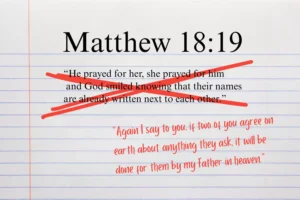I read a profound thing the other night — in a Charlie Brown cartoon, which is no surprise since I’m always reading profound things in the comics. Charlie Brown comes to Lucy’s psychiatric booth to declare that he is depressed. Lucy takes him up on a hill, shows him the vast horizon, and begins to ply him with questions. Does he see all that room for living? Has he ever seen any other worlds? As far as he knows, are there any other worlds for him to live in?
Her final question: “You were born to live in this world … right?” “Right,” he answers — and Lucy hits him with the punch line. “WELL, LIVE IN IT THEN!”
Those are inspiring words. They really are. As a philosophical day-dreamer with a tendency to fatalistic attitudes, I relate very well to Charlie Brown. The idea that here I am, placed in this world for the express purpose of living in it, is almost revolutionary to me.
That is, it was almost revolutionary to me. Sometime in the last 10 years, during the gradual transition from childhood to adulthood, it started to sink in that God wants me to live. To live fully. To live well. And to live not only for a distant future in a heaven that is still far away — that is, the ultimate Not-Yet — but to live in the Now, to live on this earth in the best way I can, recognizing every day as a gift from God. Ralph Waldo Emerson said, “I wish that life should not be cheap, but sacred. I wish days to be as centuries, loaded and fragrant.”
I am here, in the only world that has currently been given to me, and I’m doing my best to live in it. But it’s not as easy as it sounds. The apostle Paul described life as a race, as a wrestling match, and also as a battle. He recognized that living, really living as God wants us to, is hard work. We fight sin within us, evil around us, and “spiritual wickedness in high places.”
On top of all of that, we fight our own flesh. What do I mean by that? I mean that if we want to really live our days loaded and fragrant, with purpose and holy joy, we need to fight our inborn laziness; our tendency to forget; our knack for centering on trivial, unsatisfying things; and our propensity to dig ruts and sit in them.
I teach writing, so my years are naturally divided into three distinct seasons: Fall Semester, Spring Semester, and Summer. The breaks in the year afford me a perfect time to reexamine my life. Every four months, I take a hard look at the paths I’m walking. I look especially hard at my habits, for they are the real direction of my life, no matter how many grand pronouncements I may make. Management consultant Peter F. Drucker says, “Long-term planning does not deal with future decisions, but with the future of present decisions.” In other words, what am I doing now?
So. Here I am, at the brink of a new semester. It is time again to take stock of my life, to measure the worthiness of my goals, to see if I’m actually moving toward them, and to decide whether changes must be made. This every-four-month system is a good one, because it keeps my ruts from getting too deep before I see the need to leap out of them. In examining life, I want to measure the quality of the Now, but I also want to keep the Not-Yet firmly in mind. Am I living well today? And is the way I’m living actually going to lead to a good, God-honoring future — not just here, but in eternity?
First off, there’s my spiritual life. When I examine this, I have to remember that spiritual life is neither really predictable nor actually controllable, because any real spiritual life is a relationship — and the other Half of the relationship rarely conforms to my small-minded expectations. That said, as the small half of this relationship, there are things I can do to keep it healthy.
Foremost among these is prayer. For many years I’ve had the nagging feeling that my prayer life was lacking. I prayed a lot, usually sporadically throughout the day, but I was always scattered and unfocused. I’d say “I’ll pray for you,” knowing that I’d probably forget to do so. Over this past summer, though, I made a change in my prayer life that has been revolutionary. I started scheduling prayer times. Short ones, just five, 10, or 15 minutes, five to seven times a day. I got the idea from a Boundless article, actually: Jim Tonkowich’s “Hour by Hour: It’s Always Time to Pray.” I have already seen incredible fruit from this new habit in the Now, and I know it will bear more in the Not-Yet. This habit stays, and I’m making a renewed commitment to doing it diligently.
Mental life is another area to keep an eye on. Are you familiar with the verse that says, “Teach us to number our days”? I always figured it ended with something like this: “So that we may make a difference in this world.” Actually, the whole verse says, “So teach us to number our days, that we may apply our hearts unto wisdom” (Psalm 90:12). This is about spiritual life; it’s also about our mental lives. I’ve realized that I need to attend to mine in a serious way.
I try to spend at least half an hour every morning reading my Bible with an open notebook and study references handy. I really want to tackle the meat of Scripture, to wrestle with it, to ask questions and seek out answers, to learn how God sees the world and how I’m supposed to respond to that. I want to learn to think biblically. This isn’t just for the Now — it’s imperative for the Not-Yet. What I learn now, at this stage in my life where I’m able to invest time in study, forms my decision-making processes, my thought patterns, and my mental capabilities for the future.
You can see why this is hard work! Reexamining my life on a regular basis means that I refuse to allow my flesh the upper hand. I don’t want to let attitudes, bad habits, or forgetfulness prevent me from really living. Of course, I mess up in all these areas just as fast as I articulate what I want in them. But that doesn’t ultimately matter. As long as I get back up, I’ll stay on the right paths.
Many other aspects of life bear examination. Work. Health. Recreation. Am I doing what God has called me to do? Am I doing it diligently, smartly, with joy? Are my current health habits going to help me in the Not-Yet, or are they more likely to land me with lifelong problems I don’t want? Do I spend my recreation time actually re-creating — doing things that build me up — or am I frittering it away with activities I don’t much care for? How about finances? Am I giving? Could I give more? Are my spending and savings in a healthy balance? Was all that Starbucks really necessary — a real blessing or just a bad habit of letting money run out of my pocket every time I smell a latte?
Then there are relationships: the heart and blood of life. “Thine own friend, and thy father’s friend, forsake not,” instructs Proverbs 27:10. There’s something tragic about a life lived in pursuit of personal growth, goals, and passions, while the people who make life worth living are overlooked. In every season, I want to love my family, my friends, and my God wholeheartedly.
Relationships matter for the Not-Yet, too. Not only does maintaining relationships now ensure that those people will still be there in the future, but it also changes me. Relationships shape us more than anything else. In the future, I want to be loving, loyal, diligent, and Christ-like toward others. That will never happen if I neglect the Now.
I wish life to be not cheap, but sacred. God has given us life: God wants us to live it. Christians do not need to live defeatist, fate-driven, circumstance-directed lives. We can make decisions and choices that will shape our lives for the glory of God.
I wish you the best as you reexamine the paths your feet are on. May they lead you through days that are fragrant, that are loaded, that present themselves to you each day as gifts from a glorious God.
Copyright 2008 Rachel Starr Thomson. All rights reserved.











